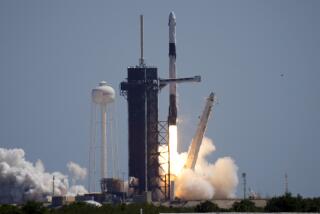Cosmonauts on Mir Become QVC Pitchmen
- Share via
NEW YORK — The pen was mightier than the word when late-night television crossed the final shopping frontier early Saturday.
Two Russian cosmonauts aboard the Mir space station, appearing live on the QVC shopping channel, set out to hawk the American-made $32.75 Fisher Space Pen, used on NASA spaceflights since 1967 because it can write in the absence of gravity.
As they orbited 200 miles above the Earth, a technical problem kept commander Anatoly Solovev and flight engineer Pavel Vinogradov from being heard discussing the pen. So one of them simply used it to write “QVC” on a pad.
“They love this pen in space,” an interpreter for the cosmonauts said during the hourlong program.
But the featured attractions at the sale, anchored from the Catch a Rising Star nightclub in Manhattan, was three $25,000 Sokol KV-2 spacesuits.
Under the club’s red, white and blue lights, cosmonaut Alexander Lazutkin provided viewers with a ground-based demonstration of the 22-pound suit. The suits, he insisted, are “in very good condition.”
At least six callers made serious inquiries about the suits, a QVC spokeswoman said.
The show also sold 11 tiny pieces of Mars rock--bits of meteorites authenticated by chemical tests as being from the Red Planet--for prices ranging from $90 to $2,500.
The Energiya space construction company, which owns Mir, regularly allows the space station to be used for commercial purposes as a means of underwriting Russia’s cash-strapped space program.
“We advertise nonalcoholic drinks, sports gear and many other things,” Mission Control Deputy Director Viktor Blagov told reporters Saturday after the QVC linkup.
Blagov noted that only Russian cosmonauts on board Mir participate in the commercial promotions, because American astronauts, such as Andrew Thomas, who is currently working aboard the Russian space station, are public servants and prohibited by U.S. law from taking part in such promotions.
“But we have no such law,” Blagov observed.
The Russian Space Agency plans to launch a broad advertising and promotion program next month, agency Director Yuri N. Koptev added.
He said the dearth of financing for Russia’s space program “forces us to take any steps, regardless of how strange they might seem,” to generate income from Mir.
More to Read
Sign up for Essential California
The most important California stories and recommendations in your inbox every morning.
You may occasionally receive promotional content from the Los Angeles Times.












